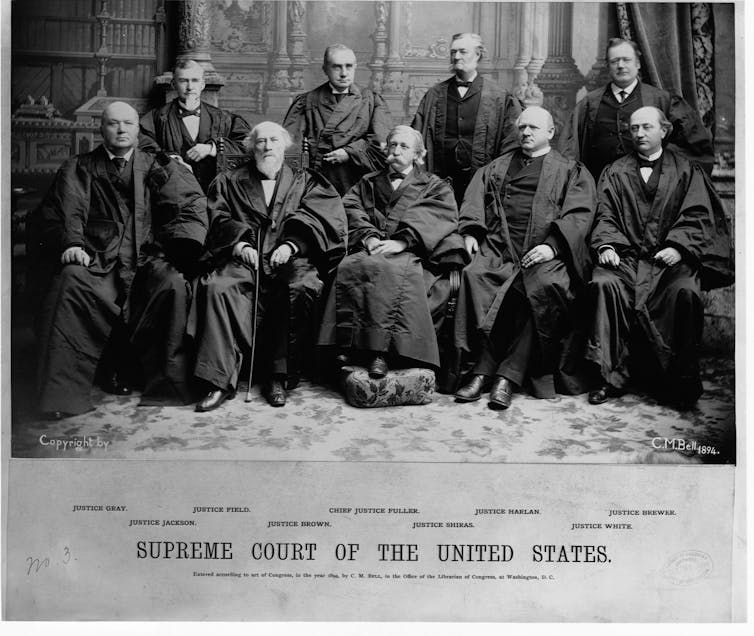Should the Supreme Court have term limits?
- Written by Paul M. Collins, Jr., Professor of Legal Studies and Political Science, University of Massachusetts Amherst
Pressure on Supreme Court Justice Stephen Breyer to step down[1] will likely grow now that the court’s session has ended.
Breyer, 82, joined the court in 1994. His retirement would allow President Joe Biden to nominate his successor[2] and give Democrats another liberal justice, if confirmed.
Supreme Court justices in the U.S. enjoy life tenure. Under Article 3 of the Constitution[3], justices cannot be forced out of office against their will, barring impeachment. This provision, which followed the precedent of Great Britain[4], is meant to ensure judicial independence, allowing judges to render decisions based on their best understandings of the law – free from political, social and electoral influences.
Our extensive research on the Supreme Court shows life tenure, while well-intended, has had unforeseen consequences. It skews how the confirmation process[5] and judicial[6] decision-making[7] work, and causes justices who want to retire to behave like political operatives[8].
Problems with lifetime tenure
Life tenure has motivated presidents to pick younger and younger[9] justices.
In the post-World War II era, presidents generally forgo appointing jurists in their 60s, who would bring a great deal of experience[10], for less experienced nominees in their 40s or 50s who could serve on the court for many decades.
 Justice Ruth Bader Ginsburg.
Brooks Kraft LLC/Corbis via Getty Images[11]
Justice Ruth Bader Ginsburg.
Brooks Kraft LLC/Corbis via Getty Images[11]
And they do[12]. Justice Clarence Thomas was appointed[13] by President George H.W. Bush at age 43 in 1991 and famously said[14] he would serve for 43 years. There’s another 13 years until his promise is met.
The court’s newest member, Donald Trump’s nominee Amy Coney Barrett, was 48 when she took her seat[15] in late 2020 after the death of 87-year-old Justice Ruth Bader Ginsburg[16].
Ginsburg, a Clinton appointee who joined the court at age 60 in 1993, refused to retire. When liberals pressed her to step down during the presidency of Democrat Barack Obama to ensure a like-minded replacement, she protested[17]: “So tell me who the president could have nominated this spring that you would rather see on the court than me?”
Partisanship problems
Justices change during their decades on the bench, research shows[18].
Justices who at the time of their confirmation espoused views that reflected the general public, the Senate and the president who appointed them tend to move away[19] from those preferences[20] over time. They become more ideological[21], focused on putting their own policy preferences[22] into law. For example[23], Ginsburg grew more liberal over time, while Thomas has become more conservative.
Other Americans’ political preferences[24] tend to be stable throughout their lives.
The consequence is that Supreme Court justices may no longer reflect the America they preside over. This can be problematic. If the court were to routinely stray too far from the public’s values, the public could reject[25] its dictates. The Supreme Court relies on public confidence to maintain its legitimacy[26].
Life tenure has also turned staffing the Supreme Court into an increasingly partisan process[27], politicizing one of the nation’s most powerful institutions[28].
In the 1980s and 1990s, Supreme Court nominees could generally expect large, bipartisan support in the Senate[29]. Today, judicial confirmation votes are almost strictly down party lines[30]. Public support for judicial nominees also shows large differences[31] between Democrats and Republicans.
Life tenure can turn supposedly independent judges into political players[32] who attempt to time their departures[33] to secure their preferred successors[34], as Justice Anthony Kennedy did in 2018. Trump appointed Brett Kavanaugh, one of Kennedy’s former clerks[35], to replace him.
 Justice Anthony Kennedy receiving the 2019 Liberty Medal from Justice Neil Gorsuch.
William Thomas Cain/Getty Images[36]
Justice Anthony Kennedy receiving the 2019 Liberty Medal from Justice Neil Gorsuch.
William Thomas Cain/Getty Images[36]
The proposed solution
Many Supreme Court[37] experts[38] have coalesced around a solution[39] to these problems: staggered, 18-year terms[40] with a vacancy automatically occurring[41] every two years in nonelection years[42].
This system would promote judicial legitimacy[43], they argue, by taking departure decisions out of the justices’ hands[44]. It would help insulate the court from becoming a campaign issue[45] because vacancies would no longer arise[46] during election years. And it would preserve judicial independence[47] by shielding the court from political calls to fundamentally alter the institution.
Partisanship would still tinge the selection and confirmation of judges by the president and Senate, however, and ideological extremists could still reach the Supreme Court. But they would be limited to 18-year terms.
The U.S. Supreme Court is one of the world’s few high courts to have life tenure. Almost all democratic nations[48] have either fixed terms or mandatory retirement ages[49] for their top judges. Foreign courts have encountered few problems[50] with term limits.
Even England – the country on which the U.S. model is based – no longer grants its Supreme Court justices life tenure. They must now retire[51] at 70.
Similarly, although many U.S. states initially granted their supreme court judges life tenure, this changed[52] during the Jacksonian era of the 1810s to 1840s when states sought to increase the accountability of the judicial branch. Today, only supreme court judges in Rhode Island[53] have life tenure. All other states either have mandatory retirement ages[54] or let voters choose when judges leave the bench through judicial elections[55].
 Back in 1894, the Supreme Court was older – not to mention whiter and all male.
C.M. Bell/Library of Congress/Corbis/VCG via Getty Images[56]
Back in 1894, the Supreme Court was older – not to mention whiter and all male.
C.M. Bell/Library of Congress/Corbis/VCG via Getty Images[56]
Polling consistently shows a large bipartisan[57] majority[58] of Americans support ending life tenure. This likely reflects eroding public confidence[59] as the court routinely issues decisions down partisan lines[60] on the day’s most controversial issues. Although ideology has long influenced[61] Supreme Court decisions, today’s court is unusual[62] because all the conservative justices are Republicans and all the liberal justices are Democrats.
In April 2021, President Biden formed a committee[63] to examine reforming the Supreme Court[64], including term-limiting justices. To end the justices’ life tenure[65] would likely mean a constitutional amendment requiring approval from two-thirds of both houses of Congress and three-fourths of U.S. states.
Ultimately, Congress, the states and the public they represent will decide whether the country’s centuries-old lifetime tenure system still serves the needs of the American people.
[The Conversation’s Politics + Society editors pick need-to-know stories. Sign up for Politics Weekly[66].]
References
- ^ Stephen Breyer to step down (www.nytimes.com)
- ^ allow President Joe Biden to nominate his successor (www.bostonglobe.com)
- ^ Article 3 of the Constitution (constitutioncenter.org)
- ^ precedent of Great Britain (blogs.chicagotribune.com)
- ^ confirmation process (www.cambridge.org)
- ^ judicial (www.sup.org)
- ^ decision-making (oxford.universitypressscholarship.com)
- ^ behave like political operatives (www.sunypress.edu)
- ^ younger and younger (qz.com)
- ^ a great deal of experience (www.fjc.gov)
- ^ Brooks Kraft LLC/Corbis via Getty Images (www.gettyimages.com)
- ^ they do (www.pewresearch.org)
- ^ Clarence Thomas was appointed (www.washingtonpost.com)
- ^ famously said (www.nytimes.com)
- ^ 48 when she took her seat (www.usnews.com)
- ^ death of 87-year-old Justice Ruth Bader Ginsburg (www.nytimes.com)
- ^ she protested (www.reuters.com)
- ^ research shows (upload.wikimedia.org)
- ^ move away (scholarlycommons.law.northwestern.edu)
- ^ from those preferences (journals.sagepub.com)
- ^ more ideological (doi.org)
- ^ policy preferences (www.cambridge.org)
- ^ For example (mqscores.lsa.umich.edu)
- ^ political preferences (www.journals.uchicago.edu)
- ^ the public could reject (www.washingtonpost.com)
- ^ maintain its legitimacy (doi.org)
- ^ partisan process (www.pbs.org)
- ^ nation’s most powerful institutions (www.jstor.org)
- ^ support in the Senate (www.senate.gov)
- ^ strictly down party lines (www.pewresearch.org)
- ^ large differences (news.gallup.com)
- ^ political players (www.latimes.com)
- ^ attempt to time their departures (www.tristatehomepage.com)
- ^ preferred successors (www.nytimes.com)
- ^ former clerks (www.washingtonpost.com)
- ^ William Thomas Cain/Getty Images (www.gettyimages.com)
- ^ Supreme Court (blogs.chicagotribune.com)
- ^ experts (view.officeapps.live.com)
- ^ solution (www.amacad.org)
- ^ staggered, 18-year terms (fixthecourt.com)
- ^ vacancy automatically occurring (www.washingtonpost.com)
- ^ in nonelection years (www.theatlantic.com)
- ^ judicial legitimacy (www.brennancenter.org)
- ^ out of the justices’ hands (www.cnn.com)
- ^ campaign issue (www.nytimes.com)
- ^ vacancies would no longer arise (www.npr.org)
- ^ preserve judicial independence (www.reuters.com)
- ^ Almost all democratic nations (www.oxfordhandbooks.com)
- ^ fixed terms or mandatory retirement ages (blogs.chicagotribune.com)
- ^ few problems (academic.oup.com)
- ^ must now retire (www.supremecourt.uk)
- ^ this changed (www.judicialselection.us)
- ^ Rhode Island (www.providencejournal.com)
- ^ mandatory retirement ages (www.ncsc.org)
- ^ judicial elections (www.routledge.com)
- ^ C.M. Bell/Library of Congress/Corbis/VCG via Getty Images (www.gettyimages.com)
- ^ a large bipartisan (www.reuters.com)
- ^ majority (www.reuters.com)
- ^ eroding public confidence (fivethirtyeight.com)
- ^ decisions down partisan lines (slate.com)
- ^ long influenced (press.princeton.edu)
- ^ unusual (www.washingtonpost.com)
- ^ formed a committee (www.nytimes.com)
- ^ reforming the Supreme Court (www.whitehouse.gov)
- ^ To end the justices’ life tenure (crsreports.congress.gov)
- ^ Sign up for Politics Weekly (theconversation.com)
Read more https://theconversation.com/should-the-supreme-court-have-term-limits-159620
















